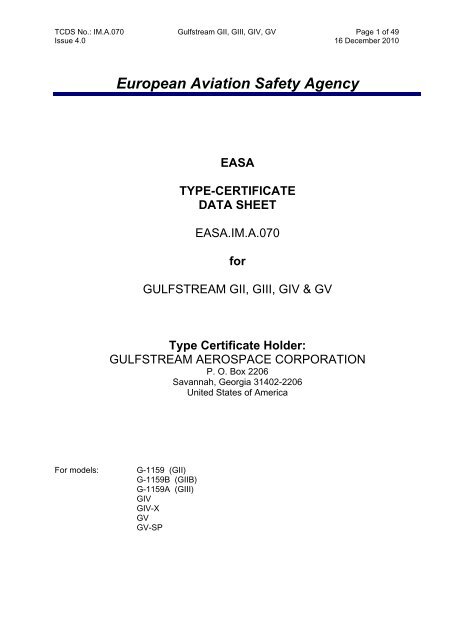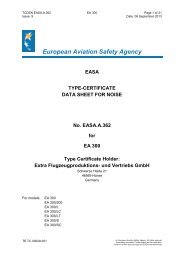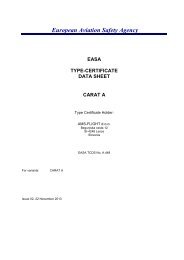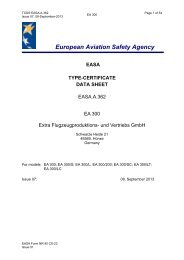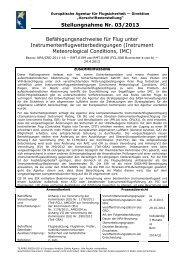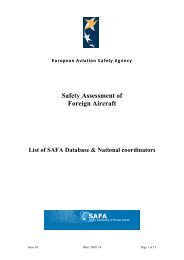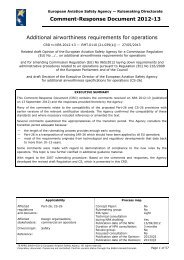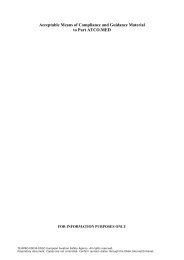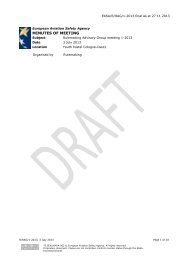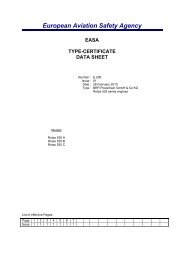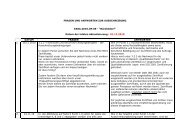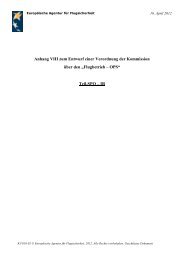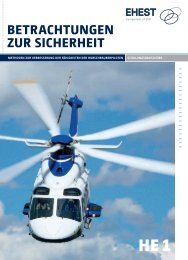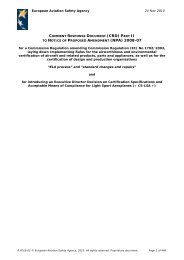European Aviation Safety Agency EASA TYPE-CERTIFICATE DATA ...
European Aviation Safety Agency EASA TYPE-CERTIFICATE DATA ...
European Aviation Safety Agency EASA TYPE-CERTIFICATE DATA ...
You also want an ePaper? Increase the reach of your titles
YUMPU automatically turns print PDFs into web optimized ePapers that Google loves.
TCDS No.: IM.A.070 Gulfstream GII, GIII, GIV, GV Page 1 of 49<br />
Issue 4.0 16 December 2010<br />
<strong>European</strong> <strong>Aviation</strong> <strong>Safety</strong> <strong>Agency</strong><br />
<strong>EASA</strong><br />
<strong>TYPE</strong>-<strong>CERTIFICATE</strong><br />
<strong>DATA</strong> SHEET<br />
<strong>EASA</strong>.IM.A.070<br />
for<br />
GULFSTREAM GII, GIII, GIV & GV<br />
Type Certificate Holder:<br />
GULFSTREAM AEROSPACE CORPORATION<br />
P. O. Box 2206<br />
Savannah, Georgia 31402-2206<br />
United States of America<br />
For models: G-1159 (GII)<br />
G-1159B (GIIB)<br />
G-1159A (GIII)<br />
GIV<br />
GIV-X<br />
GV<br />
GV-SP
TCDS IM.A.070 Page 2/49<br />
Issue 04, 16 December 2010<br />
INTENTIONALLY LEFT BLANK
TCDS IM.A.070 Page 3/49<br />
Issue 04, 16 December 2010<br />
TABLE OF CONTENTS<br />
SECTION 1: GENERAL (ALL MODELS) 5<br />
SECTION 2: G-1159 (GII) 6<br />
I. General 6<br />
II. Certification Basis 6<br />
III. Technical Characteristics and Operational Limitations 6<br />
IV. General GII Increased Range (Tip Tanks) 10<br />
V. Certification Basis 10<br />
VI. Technical Characteristics and Operational Limitations 10<br />
SECTION 3: G-1159B (GIIB) 14<br />
I. General 14<br />
II. Certification Basis 14<br />
III. Technical Characteristics and Operational Limitations 14<br />
SECTION 4: G-1159A (GIII) 18<br />
I. General 18<br />
II. Certification Basis 18<br />
III. Technical Characteristics and Operational Limitations 18<br />
SECTION 5: GIV 22<br />
I. General 22<br />
II. Certification Basis 22<br />
III. Technical Characteristics and Operational Limitations 23<br />
SECTION 6: GIV-X 28<br />
I. General 28<br />
II. Certification Basis 28<br />
III. Technical Characteristics and Operational Limitations 32
TCDS IM.A.070 Page 4/49<br />
Issue 04, 16 December 2010<br />
SECTION 7: GV 37<br />
I. General 37<br />
II. Certification Basis 37<br />
III. Technical Characteristics and Operational Limitations 39<br />
SECTION 8: GV-SP 43<br />
I. General 43<br />
II. Certification Basis 43<br />
III. Technical Characteristics and Operational Limitations 45<br />
SECTION 9: ADMINISTRATIVE 49<br />
I. Acronyms and Abbreviations 49<br />
II. Type Certificate Holder Record 49<br />
III. Change Record 49
TCDS IM.A.070 Page 5/49<br />
Issue 04, 16 December 2010<br />
SECTION I: GENERAL (ALL MODELS)<br />
1. Data Sheet No: IM.A.070<br />
2. Airworthiness Category: Large Aeroplanes<br />
3. Performance Category: A<br />
4. Certifying Authority: Federal <strong>Aviation</strong> Administration (USA)<br />
Atlanta Aircraft Certification Office<br />
1701 Columbia Avenue<br />
College Park<br />
Atlanta GA 30337<br />
U.S.A.<br />
5. Type Certificate Holder GULFSTREAM AEROSPACE CORPORATION<br />
P.O. Box 2206<br />
Savannah, Georgia 31402-2206<br />
U.S.A.
TCDS IM.A.070 Page 6/49<br />
Issue 04, 16 December 2010<br />
SECTION 2: G-1159 (GII)<br />
I. General<br />
1. Aeroplane: Gulfstream GII<br />
II. Certification Basis<br />
1. FAA Certification Date: 19 October 1967<br />
2. <strong>EASA</strong>/JAA Validation Application Date: N/A<br />
3. <strong>EASA</strong>/JAA Certification Date: 09 February 1971 (UK)<br />
4. FAA Certification Basis: CAR 4b as per FAA A12EA<br />
III. Technical Characteristics and Operational Limitations<br />
Engines 2 Rolls Royce Spey RB (163) 511-8 (Type Certificate LBA 6308)<br />
Fuel Kerosene<br />
American ASTM D 1655-75 Jet A<br />
ASTM D 1655-75 Jet A-1<br />
ASTM ES 2-74<br />
MIL-T-83133 Grade JP-8<br />
British D Eng. R.D. 2482 Issue 3<br />
D Eng. R.D. 2494 Issue 5<br />
D Eng. R.D. 2498 Issue 4<br />
D Eng. R.D. 2453 Issue 3 Am. 1<br />
D Eng. R.D. 2494 Issue 7 Am. 1<br />
Canadian 3-GP-23f<br />
JP-4 Wide Cut Type (See NOTE 5)<br />
American ASTM D 1655-75 Jet B<br />
MIL-T-5624G Grade JP-4<br />
MIL-T-5624J Grade JP-4<br />
MIL-T-5624K Grade JP-4<br />
ASTM ES 2-74<br />
British D Eng. R.D. 2486 Issue 6<br />
D Eng. R.D. 2486 Issue 8 Am. 1<br />
D Eng. R.D. 2454 Issue 3 Am. 1<br />
Canadian 3-GP-22f<br />
3-GP-22g<br />
3-GP-22h
TCDS IM.A.070 Page 7/49<br />
Issue 04, 16 December 2010<br />
Fuel (continued) JP-5 High Flash-Point Type<br />
American MIL-T-5624G Grade JP-5<br />
MIL-T-5624J Grade JP-5<br />
MIL-T-5624K Grade JP-5<br />
British D Eng. R.D. 2498 Issue 4<br />
D Eng. R.D. 2498 Issue 6<br />
Canadian 3-GP-24e<br />
3-GP-24f<br />
Fuel shall conform to the specification as listed or to subsequent<br />
revisions found in the latest approved Airplane Flight Manual.<br />
Oil Castrol 3C and 325<br />
Aeroshell Turbo Oil 390 and 500<br />
Esso/Exxon 2380<br />
Mobil Jet Oil II<br />
Chevron Jet Engine Oil 5<br />
Caltex RPM Jet Engine Oil 5<br />
Texaco S.A.T.O. 7730<br />
NOTE: Mixing of oils is not recommended for APU.<br />
Oil shall conform to the specification as listed or to subsequent<br />
revisions found in the latest approved Airplane Flight Manual.<br />
Engine Limits Static Thrust (std. day) S.L.<br />
Takeoff (5 min.) 11,400 lb.<br />
Maximum continuous 10,940 lb.<br />
Maximum permissible engine rotor operating speeds:<br />
N1 (low compressor) (106.6%) 8,950 rpm<br />
N2 (high compressor) (100.1%) 12,500 rpm<br />
Maximum permissible temperatures:<br />
Turbine outlet gas (Trimmer Resistors, Inc.)<br />
Takeoff (5 min.) 585�C<br />
Maximum continuous 540�C<br />
Momentary maximum during starts and relights 570�C<br />
Maximum with reverse thrust (30 second limit) 490�C<br />
Maximum over-temperature (20 second limit) 610�C<br />
Engines with S.B. Sp 77-43<br />
(20 second limit) 615�C<br />
(120 second limit) 595�C<br />
Oil inlet 100�C<br />
Oil inlet (15 min. limit) 120�C<br />
Fuel inlet temperature to engine high pressure pump 90�C<br />
Fuel inlet temperature (15 min. limit) 110�C
TCDS IM.A.070 Page 8/49<br />
Issue 04, 16 December 2010<br />
Engine Limits Maximum Air Bleed Extraction<br />
(continued) (Percent of no bleed mass flow)<br />
Maximum engine high pressure bleed 2.45%<br />
Maximum engine low pressure bleed 3.65%<br />
Auxiliary Power Unit (APU) AirResearch GTCP-36-6: S/N 1 thru 248 and 775<br />
Maximum permissible exhaust gas temperature 700�C<br />
Maximum rotor speed - all conditions 110%<br />
APU alternator load rating 20Kva<br />
APU rated output shaft power 10hp<br />
(with 50 lb. per min. bleed air and ambient<br />
temperate of 113�F)<br />
AirResearch GTCP-36-100G: S/N 250 thru 258, except 252<br />
Maximum permissible exhaust gas temperature -<br />
- Up to 60% rpm during start 988�C<br />
60% - 100% during start 821C� to 732�C<br />
(linear decrease)<br />
- Running 732�C<br />
Maximum rotor speed - all conditions 110%<br />
APU alternator load rating 20Kva<br />
(with 46.6 lb. per min. bleed air and<br />
ambient temperature of 103�F) 50hp<br />
Airspeed Limits (CAS) Vmo (Maximum operating)<br />
Sea level to 24,100 ft. 423 mph 367 knots<br />
Mmo =<br />
.85 @ 24,100 ft and<br />
above<br />
Va Vsb (Maneuvering)<br />
(Speed brake)<br />
Sea level to 28,100 ft.<br />
245 mph<br />
389 mph<br />
213 knots<br />
338 knots<br />
Msb =<br />
.85 @ 28,100 ft. and<br />
above<br />
Vfe (Flaps down to 39�) 196 mph 170 knots<br />
(Flaps down to 20�) 253 mph 220 knots<br />
(Flaps down to 10�) 288 mph 250 knots<br />
Vlo (Landing gear operation)<br />
Vle (Landing gear extended)<br />
Vmca (Minimum control air)<br />
Vll (Landing light operation)<br />
259 mph<br />
288 mph<br />
117 mph<br />
288 mph<br />
225 knots<br />
250 knots<br />
102 knots<br />
250 knots
TCDS IM.A.070 Page 9/49<br />
Issue 04, 16 December 2010<br />
Maximum Operating Altitude 43,000 feet (airplanes modified by Aircraft Service Change 299 are<br />
approved to 45,000 feet.)<br />
Maximum<br />
Weight<br />
(lb.)<br />
Aircraft S/N With<br />
ASC*<br />
Max. Zero<br />
Fuel<br />
1 thru 82 & 775 - - 38,000<br />
17236 Kg<br />
1 thru 82 & 775 10A & 41 39,000<br />
17690 Kg<br />
83 thru 100 - - 39,000<br />
17690 Kg<br />
1 thru 100 & 775 81 42,000<br />
19051 Kg<br />
101 thru 216 - - 42,000<br />
19051 Kg<br />
1 thru 216 and 775 256 42,000<br />
19051 Kg<br />
217 thru 258, 233 42,000<br />
except 249, 252 &<br />
775<br />
19051 Kg<br />
*See NOTE 6<br />
Max. Ramp Max.<br />
Take-Off<br />
58,000<br />
26308 Kg<br />
60,000<br />
27216 Kg<br />
60,000<br />
27216 Kg<br />
62,500<br />
28350 Kg<br />
62,500<br />
28350 Kg<br />
65,300<br />
29620 Kg<br />
65,300<br />
29620 Kg<br />
57,500<br />
26082 Kg<br />
59,500<br />
26989 Kg<br />
59,500<br />
26989 Kg<br />
62,000<br />
28123 Kg<br />
62,000<br />
28123 Kg<br />
64,800<br />
29393 Kg<br />
64,800<br />
29393 Kg<br />
Max.<br />
Landing<br />
51,430<br />
23382 Kg<br />
55,000<br />
24948 Kg<br />
55,000<br />
24948 Kg<br />
58,500<br />
26535 Kg<br />
58,500<br />
26535 Kg<br />
58,500<br />
26535 Kg<br />
58,500<br />
26535 Kg<br />
Datum Station 0 is 45 inches forward of the jig point at the centerline of the<br />
airplane in the nose wheel well.<br />
M.A.C. 147.28 in. (L.E. of M.A.C. = Fuselage Station 404.13)<br />
Fuel Capacity S/N 1 thru 82 & 775:<br />
Gravity or Pressure Fueling: Total 22,620 lb.<br />
Usable 22,500 lb.<br />
Arm* +433.0<br />
S/N 1 thru 82 & 775 with ASC 41 & ASC 10A, and S/N 83 thru 216:<br />
Gravity or Pressure Fueling: Total 23,400 lb.<br />
Usable 23,300 lb.<br />
Arm* 435.9<br />
Fuel weights based upon fuel density of 6.75 lb. per gal.<br />
See NOTE 1 for system fuel and unusable fuel.<br />
*Arm based on ground static attitude (-1.5� FRL)<br />
Oil Capacity Engine Oil 13.7 lb./14.6 U.S. pints-left engine (Arm = +564.0)<br />
14.6 lb./15.6 U.S. pints-right engine (Arm = +564.0)<br />
APU Oil 5.1 lb./5.4 U.S. pints (Arm = +620.0)<br />
Oil weights based upon oil density of 7.5 lb. per gal.<br />
See NOTE 1 for system oil.<br />
Capacities shown are for engine oil tankage only.<br />
Total engine oil is an additional 14 lb. per engine.
TCDS IM.A.070 Page 10/49<br />
Issue 04, 16 December 2010<br />
Serial No. Eligible S/N 1 thru 216, including 775; & S/N 217 thru 258 with Aircraft Service<br />
Change 233, except S/N 249 and 252. Note: GII production ended at s/n<br />
258.<br />
Environmental Standards:<br />
Noise ICAO Annex 16 Volume I (See <strong>EASA</strong> TCDSN IM.A.070)<br />
Fuel Venting & Emissions ICAO Annex 16 Volume II<br />
IV. General GII Increased Range (Tip Tanks)<br />
1. Aeroplane: Gulfstream GII<br />
V. Certification Basis<br />
1. FAA Certification Date: 13 May 1977<br />
2. <strong>EASA</strong>/JAA Validation Application Date: N/A<br />
3. <strong>EASA</strong>/JAA Certification Date: N/A<br />
4. FAA Certification Basis:<br />
VI. Technical Characteristics and Operational Limitations<br />
Engines 2 Rolls Royce Spey RB (163-25) 511-8 (Type Certificate LBA 6308)<br />
Fuel Kerosene<br />
American ASTM D 1655-75 Jet A<br />
ASTM D 1655-75 Jet A-1<br />
ASTM ES 2-74<br />
MIL-T-83133 Grade JP-8<br />
British D Eng. R.D. 2482 Issue 3<br />
D Eng. R.D. 2494 Issue 5<br />
D Eng. R.D. 2498 Issue 4<br />
D Eng. R.D. 2453 Issue 3 Am. 1<br />
D Eng. R.D. 2494 Issue 7 Am. 1<br />
Canadian 3-GP-23f<br />
JP-4 Wide Cut Type (See NOTE 5)<br />
American ASTM D 1655-75 Jet B<br />
MIL-T-5624G Grade JP-4<br />
MIL-T-5624J Grade JP-4<br />
MIL-T-5624K Grade JP-4<br />
ASTM ES 2-74<br />
British D Eng. R.D. 2486 Issue 6<br />
D Eng. R.D. 2486 Issue 8 Am. 1<br />
D Eng. R.D. 2454 Issue 3 Am. 1<br />
Canadian 3-GP-22f<br />
3-GP-22g<br />
3-GP-22h
TCDS IM.A.070 Page 11/49<br />
Issue 04, 16 December 2010<br />
JP-5 High Flash-Point Type<br />
American MIL-T-5624G Grade JP-5<br />
MIL-T-5624J Grade JP-5<br />
MIL-T-5624K Grade JP-5<br />
British D Eng. R.D. 2498 Issue 4<br />
D Eng. R.D. 2498 Issue 6<br />
Canadian 3-GP-24e<br />
3-GP-24f<br />
Fuel shall conform to the specifications as listed or to subsequent<br />
revisions found in the latest approved Airplane Flight Manual.<br />
Oil Castrol 3C and 325<br />
Aeroshell Turbo Oil 390 and 500<br />
Esso/Exxon 2380<br />
Mobil Jet Oil II<br />
Chevron Jet Engine Oil 5<br />
Caltex RPM Jet Engine Oil 5<br />
Texaco SATO 7730<br />
NOTE: Mixing of oils is not recommended for APU.<br />
Oil shall conform to the specifications as listed or to subsequent<br />
revisions found in the latest approved Airplane Flight Manual.<br />
Engine Limits Static Thrust (std. day) S.L.<br />
Takeoff (5 min.) 11,400 lb.<br />
Maximum continuous 10,940 lb.<br />
Maximum permissible engine rotor operating speeds:<br />
N1 (low compressor) (106.6%) 8,950 rpm<br />
N2 (high compressor) (100.1%) 12,500 rpm<br />
Engine Limits Maximum permissible temperatures:<br />
(continued) Turbine outlet gas (Trimmer Resistors, Inc.)<br />
Takeoff (5 min.) 585�C<br />
Maximum continuous 540�C<br />
Momentary maximum during starts and relights 570�C<br />
Maximum with reverse thrust (30 second limit) 490�C<br />
Maximum over-temperature (20 second limit) 610�C<br />
Engines with S.B. Sp 77-43 (20 second limit) 615�C<br />
(120 second limit) 595�C<br />
Oil inlet 100�C<br />
Oil inlet (15 min. limit) 120�C<br />
Fuel inlet temperature to engine high pressure pump 90�C<br />
Fuel inlet temperature (15 min. limit) 110�C<br />
Maximum Air Bleed Extraction<br />
(Percent of no bleed mass flow)<br />
Maximum engine high pressure bleed 2.45%<br />
Maximum engine low pressure bleed 3.65%
TCDS IM.A.070 Page 12/49<br />
Issue 04, 16 December 2010<br />
Auxiliary Power Unit (APU) AirResearch GTCP-36-6: S/N 1 thru 248 and 775<br />
Maximum permissible exhaust gas temperature 700�C<br />
Maximum rotor speed - all conditions 110%<br />
APU alternator load rating 20Kva<br />
APU rated output shaft power 10hp<br />
(with 50 lb. per min. bleed air and ambient<br />
temperature of 113�F)<br />
AirResearch GTCP-36-100G: S/N 250 thru 258, except 252<br />
Maximum permissible exhaust gas temperature -<br />
- Up to 60% rpm during start 988�C<br />
60% - 100% during start 821�C to 732�C<br />
(linear decrease)<br />
-Running 732�C<br />
Maximum rotor speed - all conditions 110%<br />
APU alternator load rating 20Kva<br />
APU rated output shaft power 50hp<br />
(with 46.6 lb. per min. bleed air and ambient<br />
temperature of 103�F)<br />
Airspeed Limits (CAS) Vmo (Maximum operating)<br />
345 mph (300 knots) at S.L. to 389 mph (338 knots)<br />
at 28,100 ft.<br />
Mmo =<br />
.85 @ 28,100 ft and<br />
above<br />
Va Vsb (Maneuvering)<br />
(Speed brake)<br />
Sea level to 33,500 ft.<br />
184 mph<br />
345 mph<br />
160 knots<br />
300 knots<br />
Msb =<br />
.85 @ 33,500 ft. and<br />
above<br />
Vfe (Flaps down to 39�) 196 mph 170 knots<br />
(Flaps down to 20�) 253 mph 220 knots<br />
(Flaps down to 10�) 288 mph 250 knots<br />
Vlo (Landing gear operation)<br />
Vle (Landing gear extended)<br />
Vmca (Minimum control air)<br />
Vll (Landing light operation)<br />
259 mph<br />
288 mph<br />
117 mph<br />
288 mph<br />
225 knots<br />
250 knots<br />
102 knots<br />
250 knots
TCDS IM.A.070 Page 13/49<br />
Issue 04, 16 December 2010<br />
Maximum Operating Altitude 43,000 feet (airplanes modified by Aircraft Service Change 299 are<br />
approved to 45,000 feet.)<br />
Maximum<br />
Weight (lb.)<br />
Aircraft S/N With Max. Zero<br />
ASC* Fuel<br />
1 thru 216 & 200 42,000<br />
775<br />
19051 Kg<br />
217 thru 299 - - 42,000<br />
258, except<br />
249 & 252<br />
19051 Kg<br />
Max.<br />
Ramp<br />
66,000<br />
29937 Kg<br />
66,000<br />
29937 Kg<br />
*See NOTE 6 and "Serial No. Eligible."<br />
Max.<br />
Take-Off<br />
65,500<br />
29710 Kg<br />
65,500<br />
29710 Kg<br />
Max.<br />
Landing<br />
58,500<br />
26535 Kg<br />
58,500<br />
26535 Kg<br />
Datum Station 0 is 45 inches forward of the jig point at the centerline of the<br />
airplane in the nose wheel well.<br />
M.A.C. 147.28 in. (L.E. of M.A.C. = Fuselage Station 404.13)<br />
Fuel Capacity Gravity or Pressure Fueling: Total 26,936 lb.<br />
Usable 26,800 lb.<br />
Arm* +445.2<br />
Fuel weights based upon fuel density of 6.75 lb. per gal.<br />
See NOTE 1 for system fuel and unusable fuel.<br />
*Arm based on ground static attitude (-1.5�FRL)<br />
Oil Capacity Engine Oil 13.7/14.6 U.S. pints-left engine (Arm = +564.0)<br />
14.6 lb./15.6 U.S. pints-right engine (Arm = +564.0)<br />
APU Oil 5.1 lb./5.4 U.S. pints (Arm = +620.0)<br />
Oil weights based upon oil density of 7.5 lb. per gal.<br />
See NOTE 1 for system oil.<br />
Capacities shown are for engine oil tankage only.<br />
Total engine oil is an additional 14 lb. per engine.<br />
Serial No. Eligible S/N 1 thru 216 and 775 with Aircraft Service Change 200; and S/N<br />
217 thru 258, except 249 and 252.<br />
Environmental Standards:<br />
Noise ICAO Annex 16 Volume I (See <strong>EASA</strong> TCDSN IM.A.070)<br />
Fuel Venting & Emissions ICAO Annex 16 Volume II
TCDS IM.A.070 Page 14/49<br />
Issue 04, 16 December 2010<br />
SECTION 3: G-1159B (GIIB)<br />
I. General<br />
1. Aeroplane: Gulfstream GIIB<br />
II. Certification Basis<br />
1. FAA Certification Date: 17 September 1981<br />
2. <strong>EASA</strong>/JAA Validation Application Date: N/A<br />
3. <strong>EASA</strong>/JAA Certification Date: N/A<br />
4. FAA Certification Basis:<br />
III. Technical Characteristics and Operational Limitations<br />
The G-1159B is the same as the G-1159 except for the following differences:<br />
(a) Wing: Span is increased 6 feet, chord increased forward of<br />
original front beam, contour changed forward of mid-chord, and 5-<br />
foot winglets added.<br />
(b) Fuselage: Addition of optional extended modified contour<br />
radome.<br />
(c) Maximum takeoff weight increased to 68,200 lb./69,700 lb.<br />
(d) Various changes to autopilot, flight instruments, and fuel quantity<br />
instruments.<br />
NOTE: Model G-1159, all serial numbers, are eligible for identification as Model G-1159B<br />
when modified in accordance with GAC Aircraft Service Change (ASC) 300.<br />
Engines 2 Rolls Royce Spey RB (163-25) 511-8 (Type Certificate LBA 6308)<br />
Fuel Kerosene<br />
American ASTM D 1655-75 Jet A<br />
ASTM D 1655-75 Jet A-1<br />
ASTM ES 2-74<br />
MIL-T-83133 Grade JP-8<br />
British D Eng. R.D. 2482 Issue 3<br />
D Eng. R.D. 2494 Issue 5<br />
D Eng. R.D. 2498 Issue 4<br />
D Eng. R.D. 2453 Issue 3 Am. 1<br />
D Eng. R.D. 2494 Issue 7 Am. 1<br />
Canadian 3-GP-23f<br />
JP-4 Wide Cut Type (See NOTE 5)<br />
American ASTM D 1655-75 Jet B<br />
MIL-T-5624G Grade JP-4<br />
MIL-T-5624J Grade JP-4<br />
MIL-T-5624K Grade JP-4<br />
ASTM ES 2-74<br />
British D Eng. R.D. 2486 Issue 6
TCDS IM.A.070 Page 15/49<br />
Issue 04, 16 December 2010<br />
Canadian 3-GP-22f<br />
3-GP-22g<br />
3-GP-22h<br />
D Eng. R.D. 2486 Issue 8 Am. 1<br />
D Eng. R.D. 2454 Issue 3 Am. 1<br />
JP-5 High Flash-Point Type<br />
American MIL-T-5624G Grade JP-5<br />
MIL-T-5624J Grade JP-5<br />
MIL-T-5624K Grade JP-5<br />
British D Eng. R.D. 2498 Issue 4<br />
D Eng. R.D. 2498 Issue 6<br />
Canadian 3-GP-24e<br />
3-GP-24f<br />
Fuel shall conform to the specifications as listed or to subsequent<br />
revisions found in the latest approved Airplane Flight Manual.<br />
Oil Castrol 3C and 325<br />
Aeroshell Turbo Oil 390 and 500<br />
Esso/Exxon 2380<br />
Mobil Jet Oil II<br />
Chevron Jet Engine Oil 5<br />
Caltex RPM Jet Engine Oil 5<br />
NOTE: Mixing of oils is not recommended for APU.<br />
Oil shall conform to the specifications as listed or to subsequent<br />
revisions found in the latest approved Airplane Flight Manual.<br />
Engine Limits Static Thrust (std. day) S.L.<br />
Takeoff (5 min.) 11,400 lb.<br />
Maximum continuous 10,940 lb.<br />
Maximum permissible engine rotor operating speeds:<br />
N1 (low compressor) (106.6%) 8,950 rpm<br />
N2 (high compressor) (100.1%) 12,500 rpm<br />
Maximum permissible temperatures:<br />
Turbine outlet gas (Trimmer Resistors, Inc.)<br />
Takeoff (5 min.) 585�C<br />
Maximum continuous 540�C<br />
Momentary maximum during starts and relights 570�C<br />
Maximum with reverse thrust (30 second limit) 490�C<br />
Maximum over-temperature (20 second limit) 610�C<br />
Engines with S.B. Sp 77-43 (20 second limit) 615�C<br />
(120 second limit) 595�C<br />
Oil inlet 100�C<br />
Oil inlet (15 min. limit) 120�C
TCDS IM.A.070 Page 16/49<br />
Issue 04, 16 December 2010<br />
Fuel inlet temperature to engine high pressure pump 90�C<br />
Fuel inlet temperature (15 min. limit) 110�C<br />
Maximum Air Bleed Extraction<br />
(Percent of no bleed mass flow)<br />
Maximum engine high pressure bleed 2.45%<br />
Maximum engine low pressure bleed 3.65%<br />
Auxiliary Power Unit (APU) AirResearch GTCP-36-100G<br />
Maximum permissible exhaust gas temperature -<br />
- Up to 60% rpm during start 988�C<br />
60% - 100% during start 821�C to 732�C<br />
(linear decrease)<br />
-Running 732�C<br />
Maximum rotor speed - all conditions 110%<br />
APU alternator load rating 20Kva<br />
APU rated output shaft power 50hp<br />
(with 46.6 lb. per min. bleed air and ambient<br />
temperature of 103�F)<br />
AiResearch GTCP-36-6<br />
Maximum permissible exhaust gas temperature700�C<br />
Maximum rotor speed - all conditions 110%<br />
APU Alternator load rating 20Kva<br />
APU rated output shaft power 10hp<br />
(with 50 lb. per min. bleed air and ambient<br />
temperature of 113�F)<br />
Airspeed Limits (CAS) Vmo (Maximum operating)<br />
Sea level to 28,000 ft. 392 mph 340 knots<br />
Mmo =<br />
.85 @ 28,000 ft and<br />
above<br />
Va Vsb (Maneuvering)<br />
(Speed brake)<br />
Sea level to 28,000 ft.<br />
237 mph<br />
392 mph<br />
206 knots<br />
340 knots<br />
Msb =<br />
.85 @ 28,000 ft. and<br />
above<br />
Vfe (Flaps down to 39�) 195 mph 170 knots<br />
(Flaps down to 20�) 253 mph 220 knots<br />
(Flaps down to 10�) 288 mph 250 knots<br />
Vlo (Landing gear operation)<br />
Vle (Landing gear extended)<br />
Vmca (Minimum control air)<br />
Vmcg (Minimum control ground)<br />
259 mph<br />
288 mph<br />
115 mph<br />
103 mph<br />
225 knots<br />
250 knots<br />
100 knots<br />
89 knots
TCDS IM.A.070 Page 17/49<br />
Issue 04, 16 December 2010<br />
Maximum Operating Altitude 45,000 feet<br />
Maximum<br />
Weight (lb.)<br />
Aircraft With ASC Max. Zero<br />
Mod. No. * Fuel<br />
1 & Sub. 300 42,000<br />
19051 Kg<br />
1 & Sub. 300 & 44,000<br />
275 19958 Kg<br />
* See NOTE 6.<br />
Max.<br />
Ramp<br />
68,700<br />
31162 Kg<br />
70,200<br />
31842 Kg<br />
Max.<br />
Take-Off<br />
68,200<br />
30935 Kg<br />
69,700<br />
31615 Kg<br />
Max.<br />
Landing<br />
58,500<br />
26535 Kg<br />
58,500<br />
26535 Kg<br />
Datum Station 0 is 45 inches forward of the jig point at the centerline of the<br />
airplane in the nose wheel well.<br />
M.A.C. 165.39 in. (L.E. of M.A.C. = Fuselage Station 387.81)<br />
Fuel Capacity Modification Nos. 1 thru 8<br />
Gravity or Pressure Fueling: Total 28,014 lb.<br />
Usable 27,900 lb.<br />
Arm* +430.4<br />
Modification Nos. 9 and Subsequent.<br />
Gravity or Pressure Fueling: Total 28,444 lb.<br />
Usable 28,300 lb.<br />
Arm* +423.3<br />
Fuel weights based upon fuel density of 6.75 lb. per gal.<br />
*Arm based on ground static attitude (-1.5� FRL)<br />
Oil Capacity Engine Oil 13.7 lb./14.6 U.S. pints-left engine (Arm = +564.0)<br />
14.6 lb./15.6 U.S. pints-right engine (Arm = +564.0)<br />
APU Oil 4.75 lb./5.4 U.S. pints (Arm = +620.0)<br />
Oil weights based upon oil density of 7.5 lb. per gal.<br />
See NOTE 1 for system oil.<br />
Capacities shown are for engine oil tankage only.<br />
Total engine oil is an additional 14 lb. per engine.<br />
Serial No. Eligible G-1159; S/N 1 thru 258, including 775, excluding 249 & 252, when modified<br />
by Aircraft Service Change 300.<br />
Environmental Standards:<br />
Noise ICAO Annex 16 Volume I (See <strong>EASA</strong> TCDSN IM.A.070)<br />
Fuel Venting & Emissions ICAO Annex 16 Volume II
TCDS IM.A.070 Page 18/49<br />
Issue 04, 16 December 2010<br />
SECTION 4: G-1159A (GIII)<br />
I. General<br />
1. Aeroplane: Gulfstream GIII<br />
II. Certification Basis<br />
1. FAA Certification Date: 22 September 1980<br />
2. <strong>EASA</strong>/JAA Validation Application Date: N/A<br />
3. <strong>EASA</strong>/JAA Certification Date: 16 November 1982 (UK)<br />
4. FAA Certification Basis: A12EA<br />
III. Technical Characteristics and Operational Limitations<br />
The G-1159A is the same as the G-1159 except for the following differences:<br />
(a) Wing: Span is increased 6 feet, chord increased forward of<br />
original front beam, contour changed forward of mid-chord, and 5foot<br />
winglets added.<br />
(b) Fuselage: Addition of a 2-foot section aft of main door, radome<br />
extended and contour modified, and new curved windshield and<br />
support structure.<br />
(c) Maximum takeoff weight increased to 68,200 lb./69,700 lb.<br />
(d) Various changes to autopilot, flight instruments, and engine<br />
instruments.<br />
Engines 2 Rolls Royce Spey RB (163-25) 511-8 (Type Certificate LBA 6308)<br />
Fuel Kerosene<br />
American ASTM D 1655-75 Jet A<br />
ASTM D 1655-75 Jet A-1<br />
ASTM ES 2-74<br />
MIL-T-83133 Grade JP-8<br />
British D Eng. R.D. 2482 Issue 3<br />
D Eng. R.D. 2494 Issue 5<br />
D Eng. R.D. 2498 Issue 4<br />
D Eng. R.D. 2453 Issue 3 Am. 1<br />
D Eng. R.D. 2494 Issue 7 Am. 1<br />
Canadian 3-GP-23f<br />
JP-4 Wide Cut Type (See NOTE 5)<br />
American ASTM D 1655-75 Jet B<br />
MIL-T-5624G Grade JP-4<br />
MIL-T-5624K Grade JP-4<br />
ASTM ES 2-74<br />
British D Eng. R.D. 2486 Issue 6
TCDS IM.A.070 Page 19/49<br />
Issue 04, 16 December 2010<br />
D Eng. R.D. 2486 Issue 8 Am. 1<br />
D Eng. R.D. 2454 Issue 3 Am. 1<br />
Canadian 3-GP-22f<br />
3-GP-22g<br />
3-GP-22h<br />
JP-5 High Flash-Point Type<br />
American MIL-T-5624G Grade JP-5<br />
MIL-T-5624J Grade JP-5<br />
MIL-T-5624K Grade JP-5<br />
British D Eng. R.D. 2498 Issue 4<br />
D Eng. R.D. 2498 Issue 6<br />
Canadian 3-GP-24e<br />
3-GP-24f<br />
Fuel shall conform to the specifications as listed or to subsequent<br />
revisions found in the latest approved Airplane Flight Manual.<br />
Oil Castrol 3C and 325<br />
Aeroshell Turbo Oil 390 and 500<br />
Esso/Exxon 2380<br />
Mobil Jet Oil II<br />
Chevron Jet Engine Oil 5<br />
Caltex RPM Jet Engine Oil 5<br />
Texaco SATO 7730<br />
NOTE: Mixing of oils is not recommended for APU.<br />
Oil shall conform to the specifications as listed or to subsequent<br />
revisions found in the latest approved Airplane Flight Manual.<br />
Engine Limits Static Thrust (std. day) S.L.<br />
Takeoff (5 min.) 11,400 lb.<br />
Maximum continuous 10,940 lb.<br />
Maximum permissible engine rotor operating speeds:<br />
N1 (low compressor) (106.6%) 8,950 rpm<br />
N2 (high compressor) (100.1%) 1 2,500 rpm<br />
Maximum permissible temperatures:<br />
Turbine outlet gas (Trimmer Resistors, Inc.)<br />
Takeoff (5 min.) 585�C<br />
Maximum continuous 540�C<br />
Momentary maximum during starts and relights 570�C<br />
Maximum with reverse thrust (30 second limit) 490�C<br />
Maximum over-temperature (20 second limit) 610�C<br />
Engines with S.B. Sp 77-43 (20 second limit) 615�C<br />
(120 second limit) 595�C<br />
Oil inlet 100�C<br />
Oil inlet (15 min. limit) 120�C<br />
Fuel inlet temperature to engine high pressure pump 90�C
TCDS IM.A.070 Page 20/49<br />
Issue 04, 16 December 2010<br />
Fuel inlet temperature (15 min. limit) 110�C<br />
Maximum Air Bleed Extraction<br />
(Percent of no bleed mass flow)<br />
Maximum engine high pressure bleed 2.45%<br />
Maximum engine low pressure bleed 3.65%<br />
Auxiliary Power Unit (APU) AirResearch GTCP-36-100G<br />
Maximum permissible exhaust gas temperature -<br />
- Up to 60% rpm during start 988�C<br />
60% - 100% during start 821�C to 732�C<br />
(linear decrease)<br />
-Running 732�C<br />
Maximum rotor speed - all conditions 110%<br />
APU alternator load rating 20Kva<br />
APU rated output shaft power 50hp<br />
(with 46.6 lb. per min. bleed air and ambient<br />
temperature of 103�F)<br />
Airspeed Limits (CAS) Vmo (Maximum operating)<br />
Sea level to 28,000 ft. 392 mph 340 knots<br />
Mmo =<br />
.85 @ 28,000 ft and<br />
above<br />
Va Vsb (Maneuvering)<br />
(Speed brake)<br />
Sea level to 28,000 ft.<br />
237 mph<br />
392 mph<br />
206 knots<br />
340 knots<br />
Msb =<br />
.85 @ 28,000 ft. and<br />
above<br />
Vfe (Flaps down to 39�) 195 mph 170 knots<br />
(Flaps down to 20�) 253 mph 220 knots<br />
(Flaps down to 10�) 288 mph 250 knots<br />
Vlo (Landing gear operation)<br />
Vle (Landing gear extended)<br />
Vmca (Minimum control air)<br />
Vmcg (Minimum control ground)<br />
259 mph<br />
288 mph<br />
117 mph<br />
103 mph<br />
225 knots<br />
250 knots<br />
102 knots<br />
89 knots
TCDS IM.A.070 Page 21/49<br />
Issue 04, 16 December 2010<br />
Maximum Operating Altitude 45,000 feet<br />
Maximum<br />
Weight (lb.)<br />
Aircraft S/N With Max. Zero<br />
ASC * Fuel<br />
249, 252, 300 - - (42,000)<br />
thru 426, and<br />
875<br />
19051 Kg<br />
249, 252, 300 70 (44,000)<br />
thru 426, and<br />
875<br />
19958 Kg<br />
427 thru 495 - - (44,000)<br />
19958 Kg<br />
* See NOTE<br />
6.<br />
Max.<br />
Ramp<br />
68,700<br />
31162 Kg<br />
70,200<br />
31842 Kg<br />
70,200<br />
31842 Kg<br />
Max.<br />
Take-Off<br />
68,200<br />
30935 Kg<br />
69,700<br />
31615 Kg<br />
69,700<br />
31615 Kg<br />
Max.<br />
Landing<br />
58,500<br />
26535 Kg<br />
58,500<br />
26535 Kg<br />
58,500<br />
26535 Kg<br />
Datum The zero datum is 21 inches forward of the jig point at the centerline<br />
of the airplane in the nose wheel well or 193 inches forward of<br />
Fuselage Station 193B.<br />
M.A.C. 165.4 in. (L.E. of M.A.C. = Fuselage Station 387.8)<br />
Fuel Capacity S/N 249, 252, 300 thru 371, and 875:<br />
Gravity or Pressure Fueling: Total 28,014 lb.<br />
Usable 27,900 lb.<br />
Arm* 430.4<br />
S/N 372 and subsequent and S/N 875, 249, 252, and 300 thru 371<br />
with ASC 30:<br />
Gravity or Pressure Fueling: Total 28,444 lb.<br />
Usable 28,300 lb.<br />
Arm* +423.3<br />
Fuel weights based upon fuel density of 6.75 lb. per gal.<br />
*Arm based on ground static attitude (-1.5� FRL)<br />
Oil Capacity Engine Oil 13.7 lb./14.6 U.S. pints-left engine (Arm = +564.0)<br />
14.6 lb./15.6 U.S. pints-right engine (Arm = +564.0)<br />
APU Oil 4.75 lb./5.4 U.S. pints (Arm = +620.0)<br />
Oil weights based upon oil density of 7.5 lb. per gal.<br />
See NOTE 1 for system oil.<br />
Capacities shown are for engine oil tankage only.<br />
Total engine oil is an additional 14 lb. per engine.<br />
Serial No. Eligible S/N 249, 252, 300 through 495, including S/N 875. Note: GIII production<br />
ended at s/n 495.<br />
Environmental Standards:<br />
Noise ICAO Annex 16 Volume I (See <strong>EASA</strong> TCDSN IM.A.070)<br />
Fuel Venting & Emissions ICAO Annex 16 Volume II
TCDS IM.A.070 Page 22/49<br />
Issue 04, 16 December 2010<br />
SECTION 5: GIV<br />
I. General<br />
1. Aeroplane: Gulfstream G-IV/GIV-SP<br />
II. Certification Basis<br />
1. Reference Application Date for FAA Certification: 28 February 1983<br />
2. FAA Certification Date: 22 April 1987<br />
3. <strong>EASA</strong>/JAA Validation Application Date: 14 March 2001<br />
4. <strong>EASA</strong>/JAA Certification Date: 20 October 2001*<br />
(*Date of first TC issuance within EU MS, by Austro Control, JAA recommendation 5. October<br />
2001)<br />
FAA Certification Basis:<br />
FAR Part 25, effective February 1, 1965, including Amendments 25-1 through 25-56, except for<br />
the following sections which are limited to showing compliance with the amendments indicated:<br />
Section: Amendment:<br />
25.109 FAR 25, dated 1 February 1965<br />
25.571 25-22 (as applies to fuselage and empennage)<br />
25.671 FAR 25, dated 1 February 1965<br />
25.807(c)(2) 25-15<br />
25.813 FAR 25, dated 1 February 1965<br />
FAR 36, including Amendments 36-1 through 36-12.<br />
SFAR 27, including Amendments 27-1 through 27-5.<br />
Compliance with the following Optional Ditching Requirements has been established: Data<br />
covering ditching requirements of 25.801, including 25.563, 25.807(d) and 25.1585(a) (but<br />
excluding 25.1411) are approved. When the operating rules require emergency ditching<br />
equipment, compliance with 25.1411 and 25.1415 must be demonstrated. Gulfstream Report<br />
1159-GER-7 entitled "Outfitting Requirements for FAA Certification for Ditching" provides an<br />
acceptable means for showing compliance with 25.1411 and 25.1415.<br />
Equivalent <strong>Safety</strong> Findings:<br />
� FAR 25.201, Stall Demonstration.<br />
� FAR 25.729(e)(2), Landing Gear Warning Horn.<br />
� FAR 25.773(b)(2), Direct Vision Window.<br />
� FAR 25.807(a)(4), effective February 1, 1965, Oval Emergency exit Windows with<br />
Horizontal Major Axis.
TCDS IM.A.070 Page 23/49<br />
Issue 04, 16 December 2010<br />
<strong>EASA</strong>/JAA Certification Basis:<br />
The same as the FAA Certification Basis (<strong>EASA</strong>/JAA certification was by means of the “catch-up”<br />
procedure).<br />
Environmental Standards:<br />
Noise ICAO Annex 16 Volume I (See <strong>EASA</strong> TCDSN IM.A.070)<br />
Fuel Venting & Emissions ICAO Annex 16 Volume II<br />
III. Technical Characteristics and Operational Limitations<br />
The G-IV is an airplane with two aft mounted turbofan engines, low swept wings with winglets,<br />
and a T-tail.<br />
The G-IV is also known as the G400. Aircraft Service Change (ASC) Number 440, “G400<br />
Modification” designates aircraft as Model G-IV (G400) and is applicable to serial numbers 1500<br />
and subsequent.<br />
The G-IV is also known as the G300. Aircraft Service Change (ASC) Number 436, “G300<br />
Modification” designates aircraft as Model G-IV (G300) and is applicable to serial numbers 1500<br />
and subsequent.<br />
1. <strong>EASA</strong>/JAA Type Design Definition<br />
Report GIV-GER-1301, JAA GIV Baseline Build Standard.<br />
Report GIV-GER-2009, JAA Post Type Certification Modifications.<br />
2. Engines<br />
Two Rolls Royce Tay Mark 611-8 turbofan engines.<br />
2.1 Engine Limits<br />
3. Fuel<br />
<strong>DATA</strong> SHEET: E25NE (FAA)<br />
6327 (LBA/<strong>EASA</strong>)<br />
Static thrust at sea level:<br />
� takeoff (5 minutes)*<br />
� maximum continuous<br />
61,608 N (13,850 lbs)<br />
55,247 N (12,420 lbs)<br />
* 10 minutes at take-off thrust allowed only in case of an inoperative engine due to<br />
shutdown or failure.<br />
Other engine limitations: See the Engine Type Certificate Data Sheet.<br />
Kerosene<br />
American ASTM D 1655-84, Jet A<br />
ASTM D 1655-8, Jet A-1<br />
MIL-T-83133A, Grade JP8
TCDS IM.A.070 Page 24/49<br />
Issue 04, 16 December 2010<br />
British D Eng. R.D. 2453, Issue 5<br />
D Eng. R.D. 2494, Issue 9<br />
Canadian CAN 2.3.23-M82<br />
JP-4 Wide Cut Type*<br />
American ASTM D 1655-84, Jet B<br />
MIL-T-5624L, Grade JP4<br />
British D Eng. R.D. 2454, Issue 4<br />
D Eng. R.D. 2486, issue 9<br />
Canadian CAN 2.3.22-M81<br />
JP-5 High Flash - Point Type<br />
American MIL-T-5624L, Grade JP5<br />
British D Eng. R.D. 2452, Issue 2<br />
D Eng. R.D. 2498, Issue 7<br />
Canadian CAN 3-GP-24h<br />
Fuel shall conform to the specification as listed or to subsequent revisions found in the latest<br />
approved Airplane Flight Manual.<br />
* The use of JP-4 fuel (wide cut) as agreed by the operator, Rolls-Royce, and the appropriate<br />
airworthiness authority may result in a reduction of HP fuel pump life.<br />
4. Fuel Quantity<br />
Model G-IV / GIV-SP Model G400 Model G300<br />
Total 13,429 kg 13,429 kg 12,249 kg<br />
(29,605 lbs) (29,605 lbs) (27,005 lbs)<br />
Usable 13,381 kg 13,381 kg 12,202 kg<br />
(29,500 lbs) (29,500 lbs) (26,900 lbs)<br />
5. Airplane Limit Speeds (KCAS)<br />
Maximum Operating VMO/MMO See envelope in JAA G-IV<br />
Airplane Flight Manual<br />
Manoeuvring VA 170<br />
206*<br />
Flaps Extended VFE 170 (Flaps 39°)<br />
180* (Flaps 39°)<br />
220 (Flaps 20°)<br />
250 (Flaps 10°)<br />
Landing Gear Operating VLO 225<br />
Landing Gear Extended VLE 250<br />
Minimum Control Ground VMCG 111<br />
Minimum Control Air VMCA 104<br />
* Aircraft S/N 1000 thru 1213 with 1159SB41190 (ASC 190), S/N 1214 and subsequent.
TCDS IM.A.070 Page 25/49<br />
Issue 04, 16 December 2010<br />
6. Centre of Gravity Range<br />
Refer to approved Airplane Flight Manual.<br />
7. Datum<br />
For the weight and balance purposes the zero datum is 0.4 m (15 inches) aft of the jig point at<br />
the centreline of the airplane in the nose wheel well or 5.2 m (206 in) forward of Fuselage Station<br />
206.<br />
8. Mean Aerodynamic Chord (MAC)<br />
4.2 m (166.22 in)<br />
(Leading edge of MAC at Fuselage Station 387.7)<br />
9. Maximum Operating Altitude<br />
13,716 m (45,000 ft)<br />
10. Maximum Certified Weights in kg (lbs)<br />
Aircraft S/N Max. Zero<br />
Fuel<br />
1000 thru 1213 21,092<br />
(46,500)<br />
1000 thru 1213 with ASC 61 22,226<br />
(49,000)<br />
1000 thru 1213 with ASC 261 22,226,<br />
(49,000)<br />
1000 thru 1213 with ASC 190 (GIV-SP) 22,226<br />
(49,000)<br />
1214 through 1499 (GIV-SP) 22,226<br />
(49,000)<br />
1500 through 1535 with ASC 440 22,226<br />
(G400)<br />
(49,000)<br />
1500 through 1535 with ASC 436 22,226<br />
(G300)<br />
(49,000)<br />
11. Minimum Flight Crew<br />
Two: Pilot and Co-pilot.<br />
12. Maximum Seating Capacity<br />
Nineteen – Limited by emergency exit requirements.<br />
13. Cargo Compartment Loading<br />
Max.<br />
Ramp<br />
33,384<br />
(73,600)<br />
33,384<br />
(73,600)<br />
33,384<br />
(73,600)<br />
34,019<br />
(75,000)<br />
34,019<br />
(75,000)<br />
34,019<br />
(75,000)<br />
32,840<br />
(72,400)<br />
Max.<br />
Take-Off<br />
33,203<br />
(73,200)<br />
33,203<br />
(73,200)<br />
33,203<br />
(73,200)<br />
33,838<br />
(74,600)<br />
33,838<br />
(74,600)<br />
33,838<br />
(74,600)<br />
32,658<br />
(72,000)<br />
� Maximum allowable load: 907 kg (2000 lbs)<br />
� For specific loading limitations, refer to G-IV Weight and Balance Manual.<br />
Max.<br />
Landing<br />
26,535<br />
(58,500)<br />
26,535<br />
(58,500)<br />
26,535<br />
(58,500)<br />
29,937<br />
(66,000)<br />
29,937<br />
(66,000)<br />
29,937<br />
(66,000)<br />
29,937<br />
(66,000)
TCDS IM.A.070 Page 26/49<br />
Issue 04, 16 December 2010<br />
14. Environmental Flight Envelope<br />
Refer to approved Airplane Flight Manual.<br />
15. Other Limitations<br />
Refer to approved Airplane Flight Manual.<br />
16. Auxiliary Power Unit (APU)<br />
One AirResearch GTCP-36-100G (Part No. 380062-4-1)<br />
Optional Honeywell 36-150 APU installation per ASC 465 (S/N 1000-1535)<br />
Oils: refer to applicable approved manuals.<br />
17. Equipment<br />
An approved equipment listing is provided in the Illustrated Parts Catalog. In addition, the<br />
following items of equipment are required:<br />
� When an airplane is outfitted to carry passengers, an approved passenger oxygen<br />
system must be installed.<br />
� An approved Airplane Flight Manual.<br />
18. Interior Installations<br />
Cabin interior and seating configurations must be approved.<br />
19. All Weather Capabilities<br />
Category 2 (With Aircraft Service Change 102 installed)<br />
20. Wheels and Tyres<br />
Main Landing Gear (MLG) Each MLG incorporates twin 18 inch rims and 34x9.25<br />
tyres (34x9.25-18).<br />
Nose Landing Gear (NLG) The NLG incorporates twin 10 inch rims and 21-7.25<br />
tyres (21x7.25-10).<br />
21. Hydraulics<br />
Fluid specification: Phosphate Ester Fire-resistant Type 4 Hydraulic Fluid.
TCDS IM.A.070 Page 27/49<br />
Issue 04, 16 December 2010<br />
22. Maintenance Instructions<br />
� Component life limitations are provided in Section 05-04-00, Chapter 5 of the G-IV 12/24<br />
Program Aircraft Maintenance Manual (AMM), Section 05-10-10, Chapter 5 of the G-IV MSG-<br />
3, G300 and G400 AMMs.<br />
� Maintenance criteria to comply with the certification maintenance requirements are provided<br />
in Chapter 5 of the G-IV series Aircraft Maintenance Manuals.<br />
23. Operations<br />
The GIV Type Design has been shown to be operable IAW Appendix 1 to JAR-OPS 1.430(h)<br />
when STC ST01411LA is installed in that it has been demonstrated to comply with the<br />
appropriate design and reliability requirements defined in CRI F-51. In order for those aircraft<br />
with this STC installed to meet the requirements as defined in CRI F-51, the optional EVS<br />
Image Repeater must be installed. This however implies no operational approval, this must be<br />
sought from the Authority or <strong>Agency</strong> that is legally responsible for Operational Approvals in the<br />
country of registry of individual aircraft.
TCDS IM.A.070 Page 28/49<br />
Issue 04, 16 December 2010<br />
SECTION 6: GIV-X<br />
I. General<br />
1. Aeroplane: Gulfstream GIV-X<br />
II. Certification Basis<br />
1. Reference Application Date for FAA Certification: 9 January 2001<br />
2. FAA Certification Date: 12 August 2004<br />
3. <strong>EASA</strong>/JAA Validation Application Date: 18 January 2001<br />
4. <strong>EASA</strong>/JAA Certification Date: 19 November 2004<br />
5. FAA Certification Basis:<br />
14 CFR Part 25, effective February 1, 1965, including Amendments 25-1 through 25-101 with<br />
the exceptions listed below:<br />
Section: Title: Amendment:<br />
25.21(e) Proof of compliance 25-7<br />
25.305 Strength and deformation 25-54, 25-86**<br />
25.321 Flight loads – General 25-23, 25-86**<br />
25.333 Flight maneuvering envelope 25-0, 25-86**<br />
25.335(b) Design airspeeds (speed margin) 25-23<br />
25.341 Gust and turbulence loads 25-0, 25-86**<br />
25.343 Design fuel and oil loads 25-18, 25-86**<br />
25.365 Pressurized compartment loads 25-54, 25-87**<br />
25.373 Speed control devices 25-0, 25-86**<br />
25.391 Control surface loads – General 25-0, 25-86**<br />
25.427 Unsymmetrical loads 25-0, 25-86**<br />
25.445 Auxiliary aerodynamic surfaces 25-0, 25-86**<br />
25.459 Special devices 25-0*<br />
25.491 Takeoff run 25-0, 25-91**<br />
25.561 Emergency landing conditions 25-23, 25-64 (seats),<br />
25-91 (new structure)**<br />
25.571 Damage tolerance and fatigue 25-54 (wing and<br />
evaluation of structure empennage),<br />
25-96 (fuselage changes)**<br />
25.671 Control systems-General 25-0<br />
25.677(c) Trim systems 25-0<br />
25.693 Joints 25-0*<br />
25.695 Power-boost and power- 25-0<br />
operated control system<br />
25.807 Emergency exits 25-55*<br />
25.807(c),(2),(d)(4) Emergency exits 25-15*<br />
25.813(a),(b),(c),(d),(f) Emergency exit access 25-46*<br />
25.841 Pressurized cabins 25-38, 25-87**<br />
25.857 Cargo compartment classification 25-32*<br />
25.858 Cargo or baggage compartment 25-54*<br />
smoke or fire detection systems<br />
25.963 Fuel Tanks 25-40*
TCDS IM.A.070 Page 29/49<br />
Issue 04, 16 December 2010<br />
25.973 Fuel tank filler connection 25-40*<br />
25.1013 Oil tanks 25-36*<br />
25.1447 Equipment standards for oxygen 25-41, 25-87**<br />
dispensing units<br />
25.1517 Rough air speed, VRA 5-86 (new para. - NA)*<br />
25.1557 Miscellaneous markings and 25-38*<br />
placards<br />
* These systems have no changes from the basic GIV model; therefore the paragraphs<br />
remain at the original GIV certification basis and the later amendment was not adopted.<br />
Amendment 25-0 is the original published version of Part 25, February 1, 1965.<br />
** Unmodified structure remains in compliance with the earlier amendment listed. New or<br />
modified structure is in compliance with the later amendment level listed.<br />
Part 34, Amendment 34-3.<br />
Part 36, Amendment 36-24.<br />
Shoulder harness on all seats will be in lieu of demonstrated compliance to the test<br />
requirements of §25.562(c)(5) and (c)(6) per Amendment 25-64. Compliance to the test<br />
requirements of §25.785 in reference to §25.562(c)(5) and (c)(6) need not be demonstrated<br />
due to this concession. These provisions are acceptable for single or multiple occupant<br />
seating systems which are forward, aft, or side facing.<br />
Compliance with the Optional Ditching Requirements has been established as follows: Data<br />
covering the ditching requirements of 14 CFR Part 25.801, including 25.563, 25.807 and<br />
25.1585(a), but excluding 25.1411, are approved. When the operating rules require<br />
emergency ditching equipment, compliance with Parts 25.1411 and 25.1415 must be<br />
demonstrated. Gulfstream Report No. 1159-GER-7, entitled “Outfitting Requirements for FAA<br />
Certification for Ditching”, provides an acceptable means for showing compliance with Parts<br />
25.1411 and 25.1415.<br />
FAR 25.813(e) at Amendment 25-46 is not included in the certification basis.<br />
Special Conditions:<br />
� No. 25-262-SC, HIRF (High Intensity Radiated Fields).<br />
� No. 25-180-SC, Enhanced Vision System (EVS).<br />
� No. 25-258-SC Interaction of Systems and Structure.<br />
Exemptions:<br />
� No. 8142 [FAR 25.901(c)], Uncontrolled High Thrust Failure Condition.<br />
Equivalent <strong>Safety</strong> Findings:<br />
� FAR 25.807, Elliptical Overwing Emergency Exits with a Horizontal Major Axis, TAD<br />
ELOS Memo No. AT5080AT-T-A-2.<br />
� FAR 25.841(b)(6), Cabin Pressurization – High Altitude Takeoff and Landing Field<br />
Elevations, TAD ELOS Memo No. AT5177AT-T-S-29.<br />
� FAR 25.811(d) & 25.812(b), Locator, Marker, and Bulkhead/Divider Signs, TAD ELOS<br />
Memo. No. AT5177AT-T-C-1.<br />
� FAR 25.853, 25.869, Flammability Substantiation for Electrical Equipment, TAD ELOS<br />
Memo No. AT5177AT-T-A-9.<br />
� FAR 25.933, Flight Critical Thrust Reverser, TAD ELOS Memo No. AT5080AT-T-P-1.
TCDS IM.A.070 Page 30/49<br />
Issue 04, 16 December 2010<br />
6. <strong>EASA</strong>/JAA Certification Basis:<br />
JAR Requirement Basis:<br />
� For the changes comprising the GIV-X:<br />
JAR-25 Change 15 (Effective 1 October 2000), and JAR AWO Change 2 (Effective 1<br />
August 1996).<br />
� For unchanged areas refer to GIV Certification Basis.<br />
Reversions: †<br />
� Partition Doors in PAX Compartments; JAR 25.813(e)<br />
Reference CRI D-10<br />
� Stall and Stall Warning Speeds, Various JARs<br />
Reference CRI B-3<br />
Special Conditions: †<br />
Novel Design Features:<br />
<strong>EASA</strong>/GIV/01 Enhanced Vision System<br />
Reference CRI F-10<br />
<strong>EASA</strong>/GIV/02 Human Factors Aspects of Flight Deck Design<br />
(INT/POL/25/14 Iss. 2) Reference CRI F-11<br />
<strong>EASA</strong>/GIV/03 Cursor Control Device – Airworthiness Approval<br />
Reference CRI F-12<br />
<strong>EASA</strong>/GIV/04 Integrated Standby Flight Display System<br />
Reference CRI F-02<br />
<strong>EASA</strong>/GIV/05 Interaction of Systems & Structure<br />
Reference CRI C-03<br />
Unconventional Use:<br />
<strong>EASA</strong>/GIV/10 High Altitude Operation<br />
Reference CRI D-11<br />
General Experience:<br />
<strong>EASA</strong>/GIV/06 Landing Gear Warning<br />
Reference CRI D-06<br />
<strong>EASA</strong>/GIV/07 Protection from Effects of HIRF<br />
Reference CRI F-03<br />
<strong>EASA</strong>/GIV/08 Lightning Protection – Direct Effects<br />
Reference CRI F-18<br />
<strong>EASA</strong>/GIV/09 Lightning Protection – Indirect Effects<br />
Reference CRI F-19<br />
Exemptions: †<br />
None<br />
Equivalent <strong>Safety</strong> Findings (ESFs): †<br />
� JAR 25.1357(e), 25.1309(e); MAUs – Certification.<br />
Reference CRI F-21
TCDS IM.A.070 Page 31/49<br />
Issue 04, 16 December 2010<br />
Environmental Standards:<br />
Noise ICAO Annex 16 Volume I (See <strong>EASA</strong> TCDSN IM.A.070)<br />
Fuel Venting & Emissions ICAO Annex 16 Volume II<br />
Elect to Comply Requirements: †<br />
� Hydraulic System Proof Pressure Testing<br />
Reference CRI F-14<br />
Additional National Requirements for Type Certification:<br />
� As defined in GIV CRI A-01 Addendum 1.<br />
Means of Compliance (MOC) or Interpretative Material: †<br />
� Electronic Flight Displays (JAA AMJ 25.11 & SAE ARP 4256)<br />
Reference CRI F-06<br />
� Complex Electronic Hardware (JAA Draft Guidance leaflet ‘Recognition of<br />
EUROCAE document ED-80: Design assurance guidance for airborne electronic<br />
hardware’)<br />
Reference CRI F-07<br />
� Software Design Assurance (JAA AGM Section 1, Part 3, Leaflet 4 ‘Recognition of<br />
EUROCAE ED-12B/RTCA DO-178B’)<br />
Reference CRI F-08<br />
� Systems for Specified Operational Use (Various, see CRIs)<br />
Reference CRI F-01<br />
� Equipment, Systems & Installation (JAA NPA 25F-281)<br />
Reference CRI F-09<br />
� Flight in Icing Conditions (JAA/TGM/25/02)<br />
Reference CRI F-15<br />
� Aeroplane System Wiring<br />
Reference CRI F-17<br />
� Head Up Display System<br />
Reference CRI F-04<br />
� Oxygen Requirements (JAR OPS 1.770, 1.780)<br />
Reference CRI F-16<br />
� Installation of IFE Systems (JAA TGL No.17)<br />
Reference CRI F-20<br />
� In Seat Power Supply Systems (JAA/TGM/25/10)<br />
Reference CRI F-23<br />
� Category 2 Go-Around Performance (JAR AWO 243, NPA AWO-5)<br />
Reference CRI K-01<br />
� Landing Distance using Head-Up Guidance System (JAR AWO 342)<br />
Reference CRI K-02<br />
� Floor Path Emergency Escape Path Marking System (JAR 25.812)<br />
Reference CRI D-15<br />
� All Weather Operation for Category 2 (JAR AWO Change 2) – Post TC<br />
Reference CRI F-05<br />
� Wheels and tyres Failure Analysis<br />
Reference CRI D-14<br />
� Engine Rotor Non-containment and Critical Flight Control Systems<br />
Reference CRI E-04<br />
† New <strong>EASA</strong> items raised specifically for the GIV-X project (i.e. over and above those<br />
applied by FAA and applicable to the basic FAA build standard, which are not
TCDS IM.A.070 Page 32/49<br />
Issue 04, 16 December 2010<br />
mentioned here but can be found in the FAA’s G-1 Issue Paper or the FAA TCDS).<br />
Any items generated for the GIV/GIV-SP by the JAA Team will remain applicable to the<br />
GIV-X unless otherwise incorporated by the adoption of later JAR amendments.<br />
III. Technical Characteristics and Operational Limitations<br />
The GIV-X is an airplane with two aft mounted turbofan engines, low swept wings with winglets,<br />
and a T-tail. The GIV-X differs from the G-IV in the following respects:<br />
� Honeywell advanced avionics and flight deck display<br />
� Airframe nose common with the GV-SP airplane.<br />
� Cabin main entry door rel;ocated and fuselage 12 inch extension<br />
� Aerodynamic changes for increased performance, range and economics<br />
� Derivative Tay 611-8C engines with new thrust reversers and new FADEC<br />
� System changes for reliability and and operational improvements<br />
� New APU installed<br />
The GIV-X is also known as the G450. Aircraft Service Change (ASC) Number 005, “G450<br />
Modification” designates aircraft as Model GIV-X (G450) and is applicable to serial numbers 4001<br />
and subsequent.<br />
The GIV-X is also known as the G350. Aircraft Service Change (ASC) Number 004, “G350<br />
Modification” designates aircraft as Model GIV-X (G350) and is applicable to serial numbers 4001<br />
and subsequent.<br />
1. <strong>EASA</strong>/JAA Type Design Definition<br />
Report GIVX-GER-9943, Gulfstream Model GIV-X JAA/<strong>EASA</strong> Baseline Build Standard.<br />
Report GIVX-GER-9961, JAA Post Type Certification Modifications.<br />
2. Engines<br />
Two Rolls Royce Tay Mark 611-8C turbofan engines.<br />
2.1 Engine Limits<br />
<strong>DATA</strong> SHEET: E25NE (FAA)<br />
6327 (<strong>EASA</strong>)<br />
Static thrust at sea level:<br />
� takeoff (5 minutes)*<br />
� maximum continuous<br />
61,608 N (13,850 lbs)<br />
55,247 N (12,420 lbs)<br />
* 10 minutes at take-off thrust is allowed only in case of an inoperative engine due to<br />
shutdown or failure.<br />
Other engine limitations: See the Engine Type Certificate Data Sheet.
TCDS IM.A.070 Page 33/49<br />
Issue 04, 16 December 2010<br />
3. Fuel<br />
Kerosene<br />
American ASTM D 1655, Jet A<br />
ASTM D 1655, Jet A-1<br />
MIL-T-83133A, Grade JP8*<br />
British DERD 2453, DEF STAN 91-87<br />
DERD 2494, DEF STAN 91-91<br />
Canadian CAN/CGSB-3.23<br />
JP-4 Wide Cut Type<br />
American ASTM D 1655, Jet B<br />
MIL-T-5624, Grade JP4*<br />
British (DERD 2452), DEF STAN 91-86<br />
Canadian CAN/CGSB-3.22<br />
JP-5 High Flash - Point Type<br />
American MIL-T-5624, Grade JP5<br />
Canadian CAN 3-GP-2AC<br />
Fuel shall conform to the specification as listed or to subsequent revisions<br />
found in the latest approved Airplane Flight Manual.<br />
*With fuel system icing inhibitor (FSIl). Maximum concentration 0.15% by volume.<br />
DERD 2451 Issue 2 and 3 MIL-I-27686E. or any exact equivalent<br />
4. Fuel Quantity<br />
Model G450 Model G350<br />
Total 13,429 kg 11,793 kg<br />
(29,605 lbs) (26,000 lbs)<br />
Usable 13,381 kg 11,746 kg<br />
(29,500 lbs) (25,895 lbs)<br />
5. Airplane Limit Speeds<br />
Maximum Operating VMO/MMO See envelope in JAA GIV-X<br />
Airplane Flight Manual<br />
Manoeuvring VA 206<br />
Flaps Extended VFE 170 (Flaps 39°)<br />
220 (Flaps 20°)<br />
250 (Flaps 10°)<br />
Landing Gear Operating VLO 225<br />
Landing Gear Extended VLE 250<br />
Minimum Control Ground VMCG 109<br />
Minimum Control Air VMCA 106<br />
Minimum Control Landing VMCL 99
TCDS IM.A.070 Page 34/49<br />
Issue 04, 16 December 2010<br />
6. Centre of Gravity Range<br />
Refer to approved Airplane Flight Manual.<br />
7. Datum<br />
For weight and balance purposes the zero datum is 0.7 m (27 in) aft of the jig point at the<br />
centreline of the airplane in the nose wheel well or 5.2 m (206 in) forward of Fuselage Station<br />
206.<br />
8. Mean Aerodynamic Chord (MAC)<br />
4.2 m (166.22 in)<br />
(Leading edge of MAC at Fuselage Station 387.7)<br />
9. Maximum Operating Altitude<br />
13,716 m (45,000 ft)<br />
10. Maximum Certified Weights in kg (lbs)<br />
Aircraft S/N Max.<br />
Zero Fuel<br />
G450 serials 4001 and 22,226<br />
subsequent (ASC 005) (49,000)<br />
G350 serials 4001 and 22,226<br />
subsequent (ASC 004) (49,000)<br />
G450 serials 4001 and 22,226<br />
subsequent (ASC 007A)<br />
AFMS G450-2004-01<br />
(49,000)<br />
G350 serials 4001 and 22,226<br />
subsequent (ASC 007A)<br />
AFMS G350-2004-01<br />
(49,000)<br />
G450 serials 4001 and 22,226<br />
subsequent (ASC 016)<br />
AFMS G450-2006-01<br />
(49,000)<br />
11. Minimum Flight Crew<br />
Two: Pilot and Co-pilot.<br />
12. Maximum Seating Capacity<br />
Max.<br />
Ramp<br />
33,702<br />
(74,300)<br />
32,340<br />
(71,300)<br />
33,702<br />
(74,300)<br />
32,340<br />
(71,300)<br />
34,020<br />
(75,000)<br />
Nineteen – Limited by emergency exit requirements.<br />
13. Cargo Compartment Loading<br />
Max.<br />
Takeoff<br />
33,520<br />
(73,900)<br />
32,159<br />
(70,900)<br />
33,520<br />
(73,900)<br />
32,159<br />
(70,900)<br />
33,838<br />
(74,600)<br />
Max.<br />
Landing<br />
29,937<br />
(66,000)<br />
29,937<br />
(66,000)<br />
26,535<br />
(58,500)<br />
26,535<br />
(58,500)<br />
29,973<br />
(66,000)<br />
� Maximum allowable load: 907 kg (2000 lbs)<br />
� For specific loading limitations, refer to GIV-X Weight and Balance Manual .
TCDS IM.A.070 Page 35/49<br />
Issue 04, 16 December 2010<br />
14. Environmental Flight Envelope<br />
Refer to approved Airplane Flight Manual.<br />
15. Other Limitations<br />
Refer to approved Airplane Flight Manual.<br />
16. Auxiliary Power Unit (APU)<br />
One Honeywell 36-150 (Part No. 3800794-1)<br />
Oils: refer to applicable approved Manuals<br />
17. Equipment<br />
An approved equipment listing is provided in the Illustrated Parts Catalog. In addition, the<br />
following items of equipment are required:<br />
� When an airplane is outfitted to carry passengers, an approved passenger oxygen<br />
system must be installed.<br />
� An approved Airplane Flight Manual.<br />
18. Interior Installations<br />
Cabin interior and seating configurations must be approved. G-IV cabin interior installations<br />
must be in accordance with report GIVX-GER-1619, GIV-X Interior Certification Requirements<br />
Document.<br />
19. All Weather Capabilities<br />
Category II<br />
20. Wheels and Tyres<br />
Main Landing Gear (MLG) Each MLG incorporates twin 18 inch rims and 34x9.25<br />
tyres (34x9.25-18)<br />
Nose Landing Gear (NLG) The NLG incorporates twin 10 inch rims and 21-7.25<br />
tyres (21x7.25-10)<br />
21. Hydraulics<br />
Fluid specification: Phosphate Ester Fire-resistant Type 4 Hydraulic Fluid.<br />
22. Maintenance Instructions<br />
� Component life limitations are provided in Section 05-10-10, Chapter 5 of the GIV-X (G350 /<br />
G450) Aircraft Maintenance Manual.<br />
� Maintenance criteria to comply with the certification maintenance requirements are provided<br />
in Chapter 5 of the GIV-X (G350 / G450) Aircraft Maintenance Manual.<br />
23. Emergency Exits<br />
� The flight crew must receive egress training as part of their type rating.<br />
� A pre-flight safety briefing must be conducted prior to each flight (may be completed with a<br />
video).<br />
� Passenger emergency briefing cards must be provided.<br />
� Reference CRI D-13.
TCDS IM.A.070 Page 36/49<br />
Issue 04, 16 December 2010<br />
24. Operations<br />
The GIV-X Type Design is ETOPS acceptable in that it has been demonstrated to comply with<br />
the design and reliability requirements for 180 minute ETOPS flights, however this implies no<br />
operational approval, this must be sought from the <strong>Aviation</strong> Authority of the country of registry of<br />
individual aircraft.<br />
The GIV-X Type Design has been shown to be operable IAW Appendix 1 to JAR-OPS 1.430(h)<br />
when drawings 1159F47000 Aircraft Level Equipment & Furnishings, 1159F57010 Advanced<br />
Flight Deck Cockpit Furnishings Installation, 1159F47011 Forward Fuselage Equipment<br />
Installation and 1159F47012 Forward Mid Equipment Installation are installed in that it has<br />
been demonstrated to comply with the appropriate design and reliability requirements defined<br />
in CRI F-51. This however implies no operational approval, this must be sought from the<br />
Authority or <strong>Agency</strong> that is legally responsible for Operational Approvals in the country of<br />
registry of individual aircraft.<br />
The Model designation of G450 is a production standard installation for both the HUD &<br />
EVS installations as defined above. The G350 HUD/EVS installation is optional and<br />
installed via ASC 009 - 159ASC47009 Top Level Drawing, EVS Installation
TCDS IM.A.070 Page 37/49<br />
Issue 04, 16 December 2010<br />
SECTION 7: GV<br />
I. General<br />
1. Aeroplane: Gulfstream GV<br />
II. Certification Basis<br />
1. Reference Application Date for FAA Certification: 26 February 1992<br />
2. FAA Certification Date: 11 April 1997<br />
3. <strong>EASA</strong>/JAA Validation Application Date: 21 December 1994<br />
4. <strong>EASA</strong>/JAA Certification Date: 31 October 2002<br />
5. FAA Certification Basis:<br />
FAR Part 25, effective 1 February 1965, including Amendments 25-1 through 25-81, except for<br />
the following sections which are limited to showing compliance with the amendments indicated:<br />
Section: Amendment:<br />
FAR 25.109 FAR 25, dated 1 February 1965<br />
FAR 25.807(c)(2) 25-15<br />
FAR 25.813 FAR 25, dated 1 February 1965<br />
FAR 34, including Amendment 34-1.<br />
FAR 36, including Amendments 36-1 through 36-20.<br />
Shoulder harness on all seats will be in lieu of demonstrated compliance to the test<br />
requirements of FAR 25.562(c) (1), (c) (5) and (c) (6) per Amendment 25-64.<br />
Special Conditions:<br />
HIRF (High Intensity Radiated Fields) and High Altitude Operations.<br />
Exemptions:<br />
FAR 25.571(e)(1), Bird Impact Speed.<br />
Equivalent <strong>Safety</strong> Findings:<br />
� FAR 25.341, JAR Discrete Tuned Gust in lieu of Static Gust.<br />
� FAR 25.807(a) (4), effective 1 February 1965, Oval Emergency Windows with<br />
Horizontal Major Axis.<br />
� FAR 25.933, Prevention of Inadvertent Inflight Thrust Reverser Deployment.<br />
� FAR 25.103, Stall Speeds Defined by Vs1g in lieu of Vmin.<br />
6. <strong>EASA</strong>/JAA Certification Basis:<br />
JAR-25 Change 13 (Effective 5 October 1989)<br />
Orange Paper 90/1 (Effective 11 May 1990)<br />
Orange Paper 91/1 (Effective 12 April 1991)<br />
Orange Paper 96/1<br />
JAR 25.519(b)(1)(2) only (Effective 19 April 1996)<br />
NPA 25BCD-236 (24 December 1996 Issue 1)<br />
P-NPA 25D-275 (16 Feb 1998 Issue 1 Revision 1)
TCDS IM.A.070 Page 38/49<br />
Issue 04, 16 December 2010<br />
Except for the following reversions:<br />
� JAR 25.807(c)(1) and (d)(2), Type IV Exits in lieu of Type III Exits.<br />
Reversion to FAR 25.807(c)(2) at Amendment 15<br />
� JAR 25.813(e), Partition Doors in Passenger Compartments.<br />
Reversion to FAR 25.813(d) at Amendment 0<br />
� JAR 25.562, Emergency Landing Dynamic Conditions.<br />
Reversion to JAR-25 pre Change 13<br />
JAR-AWO Change 2 (Effective 1 August 1986)<br />
NPA AWO-5 (July 1994)<br />
Special Conditions:<br />
Novel Design Features:<br />
JAA/GV/09 Interaction of Systems and Structure<br />
JAA/GV/10 Head Up Display System<br />
Unconventional Use:<br />
JAA/GV/01 High Altitude Operation<br />
General Experience:<br />
JAA/GV/02 Landing Gear Warning<br />
JAA/GV/03 Protection from the effects of HIRF<br />
JAA/GV/04 Lightning Protection - Direct Effects<br />
JAA/GV/05 Lightning Protection - Indirect Effects<br />
JAA/GV/06 Worn Brakes<br />
JAA/GV/07 Rapid Decompression<br />
JAA/GV/08 Yawing Manoeuvring Conditions<br />
Exemptions:<br />
None<br />
Equivalent <strong>Safety</strong> Findings:<br />
� JAR 25.807(a)(4), Passenger Emergency Exits (Type IV).<br />
� Accelerate-stop Distances and Related Performance.<br />
(JAA Interim Policy INT/POL/25/5 Issue 1)<br />
� JAR 25.783(e), Emergency Exit Open Indication.<br />
� JAR 25.811, Emergency Exit Marking and JAR25.812(b)(1) and (b)(2), Emergency<br />
Lighting.<br />
� JAR 25A1549(b), APU Exhaust Gas Temperature Instrument Colour Markings.<br />
� JAR 25.103, Stall Speed.<br />
Environmental Standards:<br />
Noise ICAO Annex 16 Volume I (See <strong>EASA</strong> TCDSN IM.A.070)<br />
Fuel Venting & Emissions ICAO Annex 16 Volume II
TCDS IM.A.070 Page 39/49<br />
Issue 04, 16 December 2010<br />
III. Technical Characteristics and Operational Limitations<br />
The GV is an airplane with two aft mounted turbofan engines, low swept wings with winglets,<br />
and a T-tail.<br />
1. <strong>EASA</strong>/JAA Type Design Definition<br />
Report GV-GER-1357, JAA GV Baseline Build Standard.<br />
Report GV-GER-6602, JAA Post Type Certification Modifications.<br />
<strong>EASA</strong>/JAA GV Certification is restricted to Aircraft Serial Number 541 and Subsequent.<br />
[Reference; JAA Certification Review Item (CRI) C-5 Issue 4, 25 September 2002]<br />
2. Engines<br />
Two Rolls Royce Deutschland BR700-710A turbofan engines.<br />
2.1 Engine Limits<br />
3. Fuel<br />
<strong>DATA</strong> SHEET: E00057EN (FAA)<br />
6305 (LBA) E.018 (<strong>EASA</strong>)<br />
Static thrust at sea level:<br />
� takeoff (5 minutes)*<br />
� maximum continuous<br />
65,611 N (14,750 lbs)<br />
64,277 N (14,450 lbs)<br />
* 10 minutes at take-off thrust allowed only in case of an inoperative engine due to<br />
shutdown or failure.<br />
Other engine limitations: See the Engine Type Certification Data Sheet.<br />
Kerosene<br />
American ASTM D 1655-92, Jet A<br />
ASTM D 1655-92, Jet A-1<br />
MIL-T-83133, Grade JP-8<br />
Canadian CAN/CGSB-3.23<br />
British DERD 2453<br />
DERD 2494<br />
French AIR 3405<br />
CIS GOST 10227-86, Am 1, TS-1 & RT<br />
IATA kerosene type<br />
Fuel shall conform to the specification as listed or to subsequent revisions found in the latest<br />
approved Airplane Flight Manual.
TCDS IM.A.070 Page 40/49<br />
Issue 04, 16 December 2010<br />
4. Fuel Quantity<br />
Model GV<br />
Total 18,827 kg<br />
(41,506 lbs)<br />
Usable 18,610 kg<br />
(41,026 lbs)<br />
5. Airplane Limit Speeds (KCAS)<br />
Maximum Operating VMO/MMO See envelope in JAA GV<br />
Airplane Flight Manual<br />
Manoeuvring VA 206<br />
Flaps Extended VFE 165 (Flaps 39°)<br />
206 (Flaps 20°)<br />
250 (Flaps 10°)<br />
Landing Gear Operating VLO 225<br />
Landing Gear Extended VLE 250<br />
Minimum Control Ground VMCG 103<br />
Minimum Control Air VMCA 112<br />
6. Centre of Gravity Range<br />
Refer to approved Airplane Flight Manual.<br />
7. Datum<br />
For weight and balance purposes the zero datum is 1.1 m (45 in) forward of the jig point in the<br />
nose wheel well.<br />
8. Mean Aerodynamic Chord (MAC)<br />
4.3 m (171.19 in)<br />
(Leading edge of MAC at Fuselage Station 524.74)<br />
9. Maximum Operating Altitude<br />
15,545 m (51,000 ft)<br />
10. Maximum Certified Weights in kg (lbs)<br />
Aircraft S/N Max.<br />
Zero Fuel<br />
541* & Subs<br />
23,587<br />
*see para 1 above. (52,000)<br />
11. Minimum Flight Crew<br />
Two: Pilot and Co-pilot.<br />
Max.<br />
Ramp<br />
41,231<br />
(90,900)<br />
Max.<br />
Take-Off<br />
41,050<br />
(90,500)<br />
Max.<br />
Landing<br />
34,155<br />
(75,300)
TCDS IM.A.070 Page 41/49<br />
Issue 04, 16 December 2010<br />
12. Maximum Seating Capacity<br />
Nineteen<br />
13. Cargo Compartment Loading<br />
� Maximum allowable load: 1134 kg (2500 lbs)<br />
� For specific loading limitations, refer to GV Weight and Balance Manual.<br />
14. Environmental Flight Envelope<br />
Refer to approved Airplane Flight Manual.<br />
15. Other Limitations<br />
Refer to approved Airplane Flight Manual.<br />
16. Auxiliary Power Unit (APU)<br />
Allied Signal RE220 (Part No. 3800700-1)<br />
Oils: Refer to applicable approved manuals.<br />
17. Equipment<br />
An approved equipment listing is provided in the Illustrated Parts Catalog. In addition, the<br />
following items of equipment are required:<br />
� When an airplane is outfitted to carry passengers, an approved passenger oxygen<br />
system must be installed.<br />
� An approved Airplane Flight Manual.<br />
Equipment related weight & balance changes, including those resulting from aircraft outfitting,<br />
are noted in the aircraft specific entries in the Weight and Balance Manual.<br />
18. Interior Installations<br />
Cabin interior and seating configurations must be approved.<br />
GV cabin interior installations must be in accordance with Report GV-GER-1242 'GV Interior<br />
Certification Requirements Document'.<br />
19. All Weather Capabilities<br />
Category 2 (With Aircraft Service Change 35 installed)<br />
20. Wheels and Tyres<br />
Main Landing Gear (MLG) Each MLG incorporates twin 18 inch rims and 35X11<br />
tyres (35X11-18).<br />
Nose Landing Gear (NLG) The NLG incorporates twin 10 inch rims and 21X7.25<br />
tyres (21X7.25-10).
TCDS IM.A.070 Page 42/49<br />
Issue 04, 16 December 2010<br />
21. Hydraulics<br />
Refer to approved Airplane Flight Manual.<br />
22. Maintenance Instructions<br />
� Component life limitations are provided in Section 05-10-10, Chapter 5 of the GV Aircraft<br />
Maintenance Manual.<br />
� Maintenance criteria to comply with the certification maintenance requirements are<br />
provided in Chapter 5 of the GV Aircraft Maintenance Manual.<br />
23. Operations<br />
The GV Type Design has been shown to be operable IAW Appendix 1 to JAR-OPS 1.430(h)<br />
when STC ST01201LA is installed in that it has been demonstrated to comply with the<br />
appropriate design and reliability requirements defined in CRI F-51. In order for those aircraft<br />
with this STC installed to meet the requirements as defined in CRI F-51, the optional EVS<br />
Image Repeater must be installed. This however implies no operational approval, this must be<br />
sought from the Authority or <strong>Agency</strong> that is legally responsible for Operational Approvals in<br />
the country of registry of individual aircraft.
TCDS IM.A.070 Page 43/49<br />
Issue 04, 16 December 2010<br />
SECTION 8: GV-SP<br />
I. General<br />
1. Aeroplane: Gulfstream GV-SP<br />
II. Certification Basis<br />
1. Reference Application Date for FAA Certification: 24 October 2000<br />
2. FAA Certification Date: 14 August 2003<br />
3. <strong>EASA</strong>/JAA Validation Application Date: 13 October 2000<br />
4. <strong>EASA</strong>/JAA Certification Date: 9 March 2004<br />
5. FAA Certification Basis:<br />
FAR Part 25, effective February 1, 1965, including Amendments 25-1 through 25-98, with the<br />
following exceptions:<br />
� Shoulder harnesses on all seats will be provided in lieu of demonstrated compliance to<br />
the test requirements of FAR 25.562(c)(5) and (c)(6) of Amendment 25-64. Compliance<br />
with the requirements of FAR 25.785 in reference to FAR 25.562(c)(5) and (c)(6) are<br />
not demonstrated due to this concession.<br />
� Methods of compliance with Amendment 25-92 are specified in Issue Paper F-1, Stage<br />
4, "Performance Substantiation".<br />
� The Fatigue and Damage Tolerance requirements of FAR 25.571 are limited to the<br />
fuselage and fuselage changes only.<br />
FAR Part 34, including Amendments 34-1 through 34-3.<br />
FAR Part 36, including Amendments 36-1 through 36-22.<br />
Compliance with the Optional Ditching Requirements has been established as follows: Data<br />
covering the ditching requirements of FAR 25.801, including 25.563, 25.807(e), and<br />
25.1585(a), but excluding 25.1411, are approved. When the operating rules require<br />
emergency ditching equipment, compliance with 25.1411 and 25.1415 must be demonstrated.<br />
Gulfstream Report 1159-GER-7, entitled “Outfitting Requirements for FAA Certification for<br />
Ditching” provides an acceptable means for showing compliance with 25.1411 and 25.1415.<br />
Special Conditions:<br />
� No. 25-NM-105, HIRF (High Intensity Radiated Fields).<br />
� No. 25-180-SC, Enhanced Vision Systems.<br />
Exemptions:<br />
� No. 7946 [FAR 25.813(e)], Mid-Cabin Doors Between Passenger Compartments.<br />
� No. 8004 [FAR 25.901(c)], Uncontrollable High Thrust Failure Conditions.<br />
Equivalent <strong>Safety</strong> Findings:<br />
� FAR 25.807(g)(2), Gulfstream Overwing Emergency Exit Windows.<br />
� FAR 25.841(b)(6), Cabin Pressurization - High Altitude Takeoff and Landing<br />
Operations.<br />
� FAR 25.811(d), 25.812(b)(1), Emergency Exit Marker, Locator and Bulkhead/Divider<br />
Signs.<br />
� FAR 25.853, 25.869, Flammability Substantiation of Electronic Equipment.
TCDS IM.A.070 Page 44/49<br />
Issue 04, 16 December 2010<br />
6. <strong>EASA</strong> Certification Basis<br />
JAR Requirement Basis:<br />
� For the changes comprising the GV-SP:<br />
JAR-25 Change 15 (Effective 1 October 2000), and JAR AWO Change 2 (Effective 1<br />
August 1996).<br />
� For unchanged areas see GV data above.<br />
Reversions:<br />
Reversions applicable to the GV remain applicable to GV-SP.<br />
Special Conditions:<br />
JAA Special Conditions applicable to the GV remain applicable to the GV-SP unless otherwise<br />
incorporated by the adoption of later JAR amendments. New Special Conditions raised<br />
specifically for the GV-SP project are as follows:<br />
Novel Design Features:<br />
JAA/GV/11 Enhanced Vision System.<br />
Reference CRI F-21<br />
JAA/GV/12 Human Factors Aspects of Flight Deck Design<br />
Reference CRI F-22<br />
JAA/GV/13 Cursor Control Device – Airworthiness Approval<br />
Reference CRI F-23<br />
JAA/GV/14 Integrated Standby Flight Display System.<br />
Reference CRI F-25<br />
Unconventional Use:<br />
None for the GV-SP changed areas.<br />
General Experience:<br />
None for the GV-SP changed areas.<br />
Exemptions:<br />
None<br />
Equivalent <strong>Safety</strong> Findings:<br />
JAA ESFs applicable to the GV remain applicable to the GV-SP unless otherwise incorporated<br />
by the adoption of later JAR amendments. New ESFs raised specifically for the GV-SP project<br />
are as follows:<br />
� JAR 25.1357(e) & 25.1309(e); Circuit Protective Devices.<br />
Environmental Standards:<br />
Noise ICAO Annex 16 Volume I (See <strong>EASA</strong> TCDSN IM.A.070)<br />
Fuel Venting & Emissions ICAO Annex 16 Volume II
TCDS IM.A.070 Page 45/49<br />
Issue 04, 16 December 2010<br />
III. Technical Characteristics and Operational Limitations<br />
The GV-SP is an airplane with two aft mounted turbofan engines, low swept wings with winglets,<br />
and a T-tail. The GV-SP differs from the GV in the following respects:<br />
� A Honeywell Advanced Flight Deck Display Suite to improve flight crew situational<br />
awareness and operational capabilities.<br />
� Airframe aerodynamic improvements, engine improvements, and operational changes<br />
for increased performance, range and economics.<br />
� Cabin main entry door relocated and seventh cabin window pair added.<br />
� Cabin improvements for increased baggage space, external visibility and comfort.<br />
� Minor system changes for increased reliability and space utilization.<br />
The GV-SP is also known as the G550. Aircraft Service Change (ASC) Number 11, “G550<br />
Modification” designates aircraft as Model GV-SP (G550) and is applicable to serial numbers<br />
5001 and subsequent.<br />
Aircraft Service Change (ASC) Number 063, “Mid-Wing Ejector” designates aircraft applicability<br />
for this modification. This modification is for GVSP aircraft that have had ASC 11 (G550<br />
modification) only. Reference <strong>EASA</strong> Approval # <strong>EASA</strong>.IM.A.C.01197<br />
The GV-SP is also known as the G500. Aircraft Service Change (ASC) Number 10, “G500<br />
Modification” designates aircraft as Model GV-SP (G500) and is applicable to serial numbers<br />
5001 and subsequent.<br />
1. <strong>EASA</strong>/JAA Type Design Definition<br />
Report GVSP-GER-6139, Gulfstream Model GV-SP JAA/<strong>EASA</strong> Baseline Build Standard.<br />
Report GVSP-GER-7656, <strong>EASA</strong>/JAA Post Type Certification Modifications.<br />
2. Engines<br />
Two Rolls Royce Deutschland BR700-710C4-11 turbofan engines.<br />
2.1 Engine Limits<br />
3. Fuel<br />
<strong>DATA</strong> SHEET: E00057EN (FAA)<br />
6305 (LBA) E.018 (<strong>EASA</strong>)<br />
Static thrust at sea level:<br />
� takeoff (5 minutes)*<br />
� maximum continuous<br />
68,436 N (15,385 lbs)<br />
64,277 N (14,450 lbs)<br />
* 10 minutes at take-off thrust is allowed only in case of an inoperative engine due to<br />
shutdown or failure.<br />
Other engine limitations: See the Engine Type Certificate Data Sheet.<br />
Kerosene<br />
American ASTM D 1655-92, Jet A<br />
ASTM D 1655-92, Jet A-1<br />
MIL-T-83133, Grade JP-8
TCDS IM.A.070 Page 46/49<br />
Issue 04, 16 December 2010<br />
British DERD 2453 (DEF STAN 91-97)<br />
DERD 2494 (DEF STAN 91-91)<br />
Canadian CAN/CGSB-3.23<br />
French AIR 3405<br />
CIS GOST 10227-86, Am 1, TS-1 & RT<br />
IATA kerosene type<br />
Fuel shall conform to the specification as listed or to subsequent revisions found in the latest<br />
approved Airplane Flight Manual.<br />
4. Fuel Quantity<br />
Model G550 Model G500<br />
Total 18,820 kg 16,052 kg<br />
(41,489 lbs) (35,389 lbs)<br />
Usable 18,734 kg 15,966 kg<br />
(41,300 lbs) (35,200 lbs)<br />
5. Airplane Limit Speeds (KCAS)<br />
Maximum Operating VMO/MMO See envelope in JAA GV-SP<br />
Airplane Flight Manual<br />
Manoeuvring VA 206<br />
Flaps Extended VFE 170 (Flaps 39°)<br />
220 (Flaps 20°)<br />
250 (Flaps 10°)<br />
Landing Gear Operating VLO 225<br />
Landing Gear Extended VLE 250<br />
Minimum Control Ground VMCG 107<br />
Minimum Control Air VMCA 112<br />
6. Center of Gravity Range<br />
Refer to approved Airplane Flight Manual.<br />
7. Datum<br />
For weight and balance purposes the zero datum is 1.1 m (45 in) forward of the jig point in the<br />
nose wheel well.<br />
8. Mean Aerodynamic Chord (MAC)<br />
4.3 m (171.19 in)<br />
(Leading edge of MAC at Fuselage Station 524.74)<br />
9. Maximum Operating Altitude<br />
15,545 m (51,000 ft)
TCDS IM.A.070 Page 47/49<br />
Issue 04, 16 December 2010<br />
10. Maximum Certified Weights in kg (lbs)<br />
Aircraft S/N Max. Zero<br />
Fuel<br />
G550 serials 5001 and 23,587<br />
subsequent (ASC 11) (52,000)<br />
G500 serials 5001 and 23,587<br />
subsequent (ASC 10) (52,000)<br />
G550 with ASC 063 24,040<br />
Installed (53,000)<br />
11. Minimum Flight Crew<br />
Two: Pilot and Co-pilot.<br />
12. Maximum Seating Capacity<br />
Nineteen<br />
13. Cargo Compartment Loading<br />
Max.<br />
Ramp<br />
41,458<br />
(91,400)<br />
38,782<br />
(85,500)<br />
41,458<br />
(91,400)<br />
Max.<br />
Takeoff<br />
41,277<br />
(91,000)<br />
38,601<br />
(85,100)<br />
41,277<br />
(91,000)<br />
Max.<br />
Landing<br />
34,155<br />
(75,300)<br />
34,155<br />
(75,300)<br />
34,155<br />
(75,300)<br />
� Maximum allowable load: 1134 kg (2500 lbs)<br />
� For specific loading limitations, refer to GV-SP Weight and Balance Manual.<br />
14. Environmental Flight Envelope<br />
Refer to approved Airplane Flight Manual.<br />
15. Other Limitations<br />
Refer to approved Airplane Flight Manual.<br />
16. Auxiliary Power Unit (APU)<br />
Allied Signal RE220 (Part No. 3800700-1)<br />
Oils: refer to applicable approved Manuals<br />
17. Equipment<br />
An approved equipment listing is provided in the Illustrated Parts Catalog. In addition, the<br />
following items of equipment are required:<br />
� When an airplane is outfitted to carry passengers, an approved passenger oxygen<br />
system must be installed.<br />
� An approved Airplane Flight Manual.<br />
Equipment related weight & balance changes, including those resulting from aircraft outfitting,<br />
are noted in the aircraft specific entries in the Weight and Balance Manual.
TCDS IM.A.070 Page 48/49<br />
Issue 04, 16 December 2010<br />
18. Interior Installations<br />
Cabin interior and seating configurations must be approved.<br />
GV-SP cabin interior installations must be in accordance with Report GVSP-GER-6044<br />
‘Gulfstream GV-SP Interior Certification Requirements Document’.<br />
19. All Weather Capability<br />
Category II<br />
20. Wheels and Tyres<br />
Main Landing Gear (MLG) Each MLG incorporates twin 18 inch rims and 35X11<br />
tyres (35X11-18).<br />
Nose Landing Gear (NLG) The NLG incorporates twin 10 inch rims and 21X7.25<br />
tyres (21X7.25-10).<br />
21. Hydraulics<br />
Refer to approved Airplane Flight Manual.<br />
22. Maintenance Instructions<br />
� Component life limitations are provided in Section 05-10-10, Chapter 5 of the GV-SP (G500 /<br />
G550) Aircraft Maintenance Manual.<br />
� Maintenance criteria to comply with the certification maintenance requirements are<br />
provided in Chapter 5 of the GV-SP (G500 / G550) Aircraft Maintenance Manual.<br />
23. Operations<br />
The GV-SP Type Design is ETOPS acceptable in that it has been demonstrated to comply<br />
with the design and reliability requirements for 180 minute ETOPS flights, however this implies<br />
no operational approval, this must be sought from the <strong>Aviation</strong> Authority of the country of<br />
registry of individual aircraft.<br />
The GV-SP Type Design has been shown to be operable IAW Appendix 1 to JAR-OPS<br />
1.430(h) when drawings 1159F57000 Aircraft Level Equipment & Furnishings, 159F57010<br />
Advanced Flight Deck Cockpit Furnishings Installation, 1159F57011 AFD Forward Fuselage<br />
Equipment Installation and1159F57012 AFD Forward Mid Equipment Installation are<br />
installed in that it has been demonstrated to comply with the appropriate design and<br />
reliability requirements defined in CRI F-51. This however implies no operational approval,<br />
this must be sought from the Authority or <strong>Agency</strong> that is legally responsible for Operational<br />
Approvals in the country of registry of individual aircraft.<br />
The Model designation of G550 is a production standard installation for both the HUD &<br />
EVS installations as defined above. The G500 HUD/EVS installation is optional and<br />
installed via ASC 013 - 159ASC57013 Top Level Drawing, HUD/EVS Installation.
TCDS IM.A.070 Page 49/49<br />
Issue 04, 16 December 2010<br />
SECTION: ADMINISTRATIVE<br />
I. Acronyms and Abbreviations<br />
APU: Auxiliary Power Unit<br />
ASC: Aircraft Service Change<br />
AWO: All Weather Operation<br />
CRI: Certificaton Review Item<br />
<strong>EASA</strong>: <strong>European</strong> <strong>Aviation</strong> <strong>Safety</strong> <strong>Agency</strong><br />
ESF: Equivalent <strong>Safety</strong> Finding<br />
FAA: Federal <strong>Aviation</strong> Administration<br />
JAR: Joint <strong>Aviation</strong> Requirement<br />
NPA: Notice of Proposed Amendment<br />
INT/POL: JAA Interim Policy<br />
RVSM: Reduced Vertical Separation Minima<br />
SB: Service Bulletin<br />
SC: Special Condition<br />
S/N: Serial Number<br />
II. Type Certificate Holder Record<br />
GULFSTREAM AEROSPACE CORPORATION<br />
P.O. Box 2206<br />
Savannah, Georgia 31402-2206<br />
U.S.A.<br />
III. Change Record<br />
Starting with Issue 4.0<br />
Issue Date Changes TC issue<br />
Issue 4.0 16/12/2010 Minor typographical errors corrected and reference<br />
to <strong>EASA</strong> Noise TCDSN added.<br />
[insert rows as needed]<br />
-END-<br />
Initial Issue,<br />
06/06/2006


